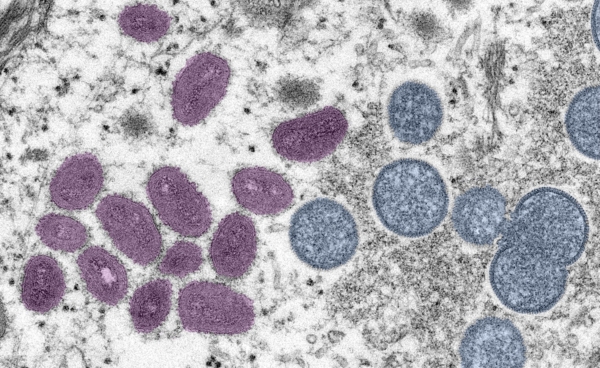
With monkeypox spreading across the country, the White House today declared the outbreak a public health emergency.
North Carolina has reported more than 70 cases of the virus so far, according to data compiled by the state Department of Health and Human Services.
Nearly half of the cases have been in Mecklenburg County.
Monkeypox is a rare disease typically found in West and Central Africa. Before this year, most cases in the US have been associated with international travel. The disease often starts with flu-like symptoms and develops into a rash and skin lesions. Monkeypox is not usually fatal, although children, some people with compromised immune systems or underlying health conditions can develop more severe illness, according to the World Health Organization.
Men who have sex with other men have been the primary source of spreading and contracting the virus thus far, though monkeypox is not a sexually transmitted disease. Black men, in particular, have been disproportionately affected.
NCDHHS Secretary Kody Kinsley recently emphasized that anyone can get infected and addressed the stigma surrounding gay men. “This is not a gay disease,” he said at a virtual town hall meeting last Thursday cosponsored by the department and the nonprofit advocacy group Equality NC.
“Viruses don’t have a preference in different communities. And I see a health disparity. … Right now, we have a disproportionate outcome where only certain groups are contracting it. We want to solve that and achieve a fair outcome of no one with monkeypox.”
Kinsley also said that the department wants to support those who are stigmatized and make them not feel afraid of who they are.
“We want to provide culturally competent care that doesn’t further stigmatize or create shame around normal parts of life,” he said. “I believe us tackling this head-on and being very transparent that there is no shame in being sick and there is no shame in sex is an important thing for us to do and folks to hear from us as well.”
Last week, NCDHHS further expanded eligibility for monkeypox vaccination. It has also been increasing awareness of the disease and the importance of getting tested.
“Our focus at the department and working with healthcare providers across the state is to make sure we can wrap the right prevention supports in the way of vaccines,” Kinsley said. “And other services, supports and access to testing around those individuals to serve them.”
The virtual townhall also featured Dr. Victoria Mobley, an NCDHHS medical consultant and adjunct professor of epidemiology at UNC Gillings School of Global Public Health.
Though the virus can spread by personal, skin-to-skin contact, Mobley provided insight into how it can also spread through touching objects or other body parts.
“If you are known to have monkeypox or an unexplained rash, don’t share items between individuals,” Mobley said. “Frequent hand washing is important. We touch our skin a lot when we have rashes that itch or hurt. We touch lesions and we can transmit them to our fingers or other parts of the body.”
Mobley also gave details about vaccination priorities.
“The first group would be individuals who have had close to intimate skin-to-skin contact with someone with monkeypox in the preceding 14 days,” she said. “If you get vaccinated within the four days after your exposure, the vaccine may prevent illness altogether from developing.”
Those with jobs that deal with skin-to-skin contacts, such as massage therapists, are also at a heightened risk. At least one case was from this form of exposure.
Jynneos — the two-dose vaccine for monkeypox and smallpox — is currently being given statewide at several local health departments. Vaccination is free and based on the availability of the vaccine.
The CDC reports that individuals who received a smallpox vaccination decades ago enjoy a measure of protection against monkeypox, though the protection “may not necessarily be lifelong.” It notes that some people previously vaccinated against smallpox have contracted monkeypox in the current outbreak and during another outbreak in 2003. The U.S. stopped providing vaccinations against smallpox in 1972 when the disease was declared to have been eradicated.
As of Aug. 3, the CDC’s latest data shows there are 26,208 cases worldwide, with 6,616 of them in the United States. Most of them are in countries that have not historically reported monkeypox.
This week, California joined Illinois and New York as the latest state to declare a state of emergency due to the outbreak.
The World Health Organization also declared the monkeypox outbreak a global health emergency on July 23.








